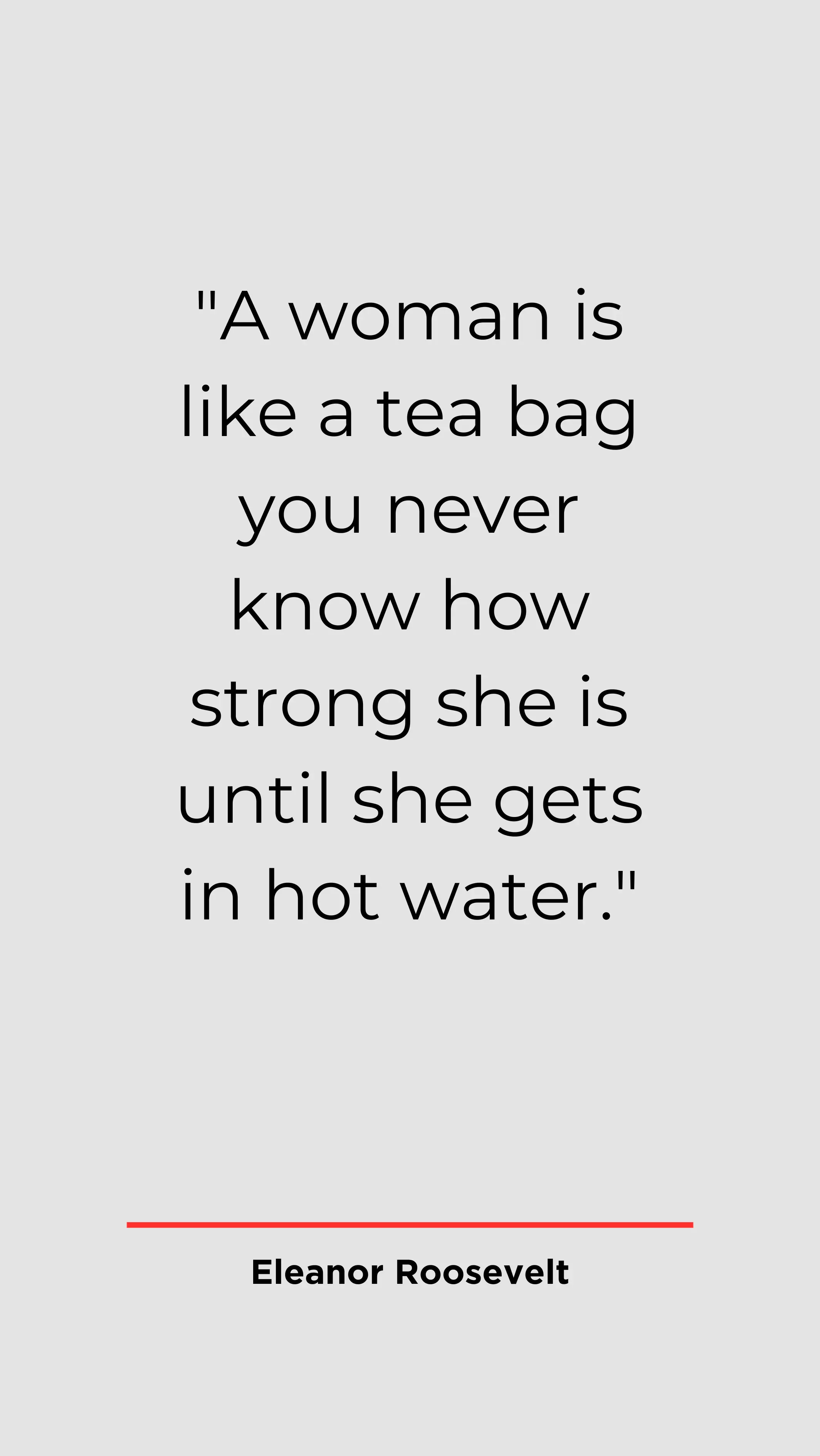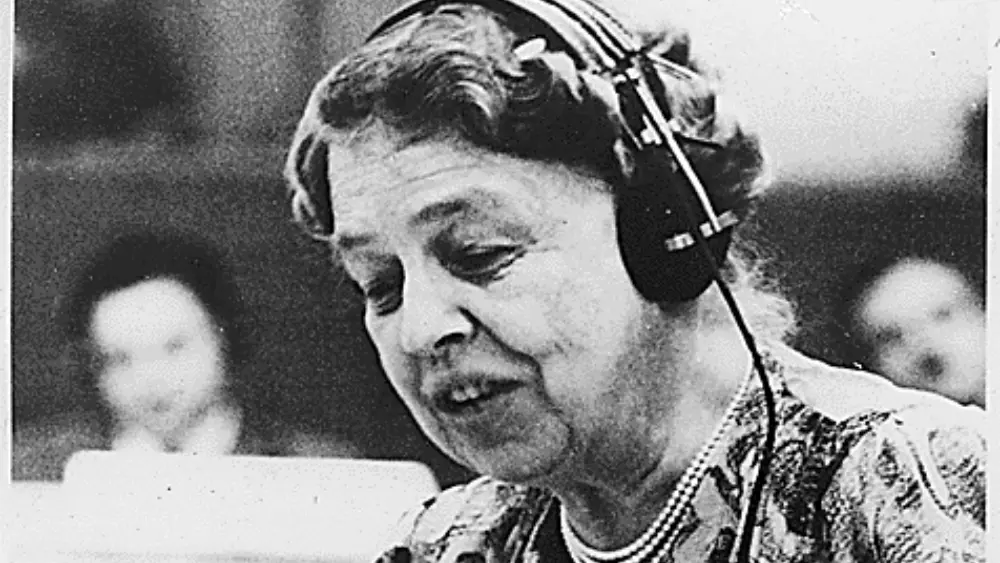Eleanor Roosevelt, often referred to as the “First Lady of the World,” was a remarkable figure in American history known for her tireless advocacy and humanitarian efforts. Born on October 11, 1884, in New York City, she served as the First Lady of the United States from 1933 to 1945 during her husband Franklin D. Roosevelt’s presidency. Eleanor’s commitment to social justice and her active involvement during World War II in supporting troops and boosting their morale set her apart as a symbol of compassion and strength.
Early Life and Activism
Eleanor Roosevelt’s early life was characterized by a series of personal trials and tribulations that shaped her into the compassionate and resilient activist she would later become. Born into privilege, she faced the loss of both her parents at a young age and endured a difficult childhood. However, these hardships instilled in her a profound sense of empathy and a burning desire to make a positive impact on the world. It was through her marriage to Franklin D. Roosevelt that Eleanor found her path into the realm of American politics and public service. As the First Lady of the United States, she leveraged her position to champion causes close to her heart, from civil rights to women’s rights, forever leaving an indelible mark on the nation’s history.
Eleanor Roosevelt’s journey from a challenging early life to a life of impactful activism shows her transformative power of resilience and determination. Her marriage not only connected her to American politics but also gave her a platform to effect meaningful change. Throughout her life, she remained unwavering in her commitment to advocating for justice, equality, and social progress, leaving a lasting legacy as one of the most influential First Ladies in American history.
Eleanor Roosevelt: The Great Depression and New Deal Era
Eleanor Roosevelt’s role as First Lady during the Great Depression marked a pivotal chapter in her life, where she emerged as a compassionate and influential figure in American history. In the midst of the economic turmoil that gripped the nation, she dedicated herself to advocating for much-needed economic relief and comprehensive social reform. Her tireless efforts and advocacy laid the groundwork for her future contributions during World War II, where her leadership and commitment to humanitarian causes would shine even brighter.
During the Great Depression and the New Deal era, Eleanor Roosevelt’s dedication to addressing the pressing social and economic issues of her time set her apart as a remarkable force for change. Her legacy as a champion of social justice and a beacon of hope during times of crisis continues to inspire generations, underscoring the enduring impact of her advocacy and leadership during these pivotal years in American history.
World War II Begins: A Nation in Crisis
The outbreak of World War II in 1939 sent shockwaves through the world, plunging nations into a state of crisis and uncertainty. In the midst of this tumultuous period, Eleanor Roosevelt displayed remarkable foresight and unwavering determination. Recognizing the pivotal role the United States would play in the conflict, she wasted no time in mobilizing her efforts to support both the troops on the front lines and the families left behind on the home front. Her tireless work during this critical time showcased her deep commitment to the welfare of the nation and her profound understanding of the importance of unity and resilience in times of global upheaval.
Eleanor’s dedication to assisting those affected by World War II underscored her role as a compassionate and influential figure during one of the most challenging periods in modern history. Her efforts not only provided vital support to the troops and their families but also served as an affirmation of the strength and resilience of the American spirit in the face of adversity. Through her actions, she embodied the principles of compassion and solidarity that defined the nation’s response to the crisis of World War II.
Eleanor Roosevelt: Visiting Troops and Boosting Morale
Eleanor Roosevelt’s unwavering commitment to supporting the troops during World War II extended far beyond the halls of power. Her dedication was made palpable through her frequent visits to military bases and hospitals, where she personally connected with soldiers and their families. These visits served as a powerful symbol of her empathy and her genuine concern for the well-being of those who were sacrificing so much for their nation. Her ability to uplift spirits and boost morale through these personal interactions became an integral part of her legacy as a compassionate and influential figure during a time of great national and global upheaval.
Eleanor’s tireless efforts to connect with and inspire the troops showcased her exceptional leadership and her profound understanding of the importance of human connection during times of conflict. Her visits not only provided much-needed comfort and support but also served as a reminder of the enduring strength and resilience of the American people. Eleanor Roosevelt’s role in boosting morale and fostering a sense of unity among the troops and their families remains a poignant example of her lasting impact on the nation’s history.
United Services Organizations Tours and Radio Broadcasts
Eleanor Roosevelt’s dedication to supporting the troops during World War II took on multifaceted forms, including her involvement in USO tours. Through these tours, she embarked on a mission to entertain and uplift the spirits of soldiers stationed both at home and abroad. Her presence at these events served as a powerful symbol of gratitude and encouragement, reminding servicemen and women that their sacrifices were deeply appreciated. These United Services Organizations tours allowed her to directly connect with those in uniform, fostering a sense of camaraderie and reminding them of the nation’s unwavering support.
Beyond the physical visits, Eleanor’s influence extended to the airwaves through her radio broadcasts, most notably “My Day.” These broadcasts not only showcased her eloquence and charisma but also connected her with the American public on a personal level. In a time of great uncertainty and difficulty, her radio messages provided reassurance and a sense of unity.
Eleanor Roosevelt: Humanitarian Efforts on the Home Front
Eleanor Roosevelt’s humanitarian efforts during World War II extended far beyond her support for the military. She emerged as a tireless champion for civil rights, women’s rights, and the welfare of refugees, demonstrating a profound commitment to justice and compassion. As a vocal advocate for civil rights, she worked to address racial discrimination and inequality, pushing for policies and initiatives aimed at advancing the rights of marginalized communities. Her dedication to women’s rights was equally fervent, as she advocated for gender equality in the workplace and beyond, laying the groundwork for the feminist movement that would follow. Additionally, Eleanor’s concern for refugees’ welfare highlighted her global perspective, as she tirelessly worked to alleviate the suffering of those displaced by the war. Her multifaceted humanitarian efforts on the home front showcased her as a beacon of hope and progress during a time of global turmoil.
Eleanor Roosevelt’s commitment to various humanitarian causes during World War II demonstrated her unwavering belief in the principles of justice and compassion. Her advocacy for civil rights, women’s rights, and the welfare of refugees not only reflected her profound empathy but also inspired generations to come, leaving an enduring legacy of social progress and human rights activism that continues to shape the world today.

The Formation of the United Nations
Eleanor Roosevelt’s post-war contributions were nothing short of historic, particularly in her pivotal role in the formation of the United Nations. As one of the driving forces behind the creation of this global organization, she played a central role in shaping the vision and principles that underpin the UN’s mission of promoting peace and human rights. Her leadership and advocacy continued as she became the first U.S. delegate to the UN General Assembly, a position that further solidified her legacy as a staunch global advocate for peace and the protection of human rights.
Eleanor’s tireless efforts within the United Nations exemplified her unwavering commitment to the betterment of the world and the prevention of future global conflicts. Her work at the United Nations not only showcased her diplomatic skills but also reinforced her status as a revered figure in the pursuit of international cooperation and the advancement of human rights on a global scale. Eleanor Roosevelt’s contributions to the formation and early days of the United Nations continue to attest to the enduring importance of diplomacy and collective action in addressing the world’s most pressing challenges.




